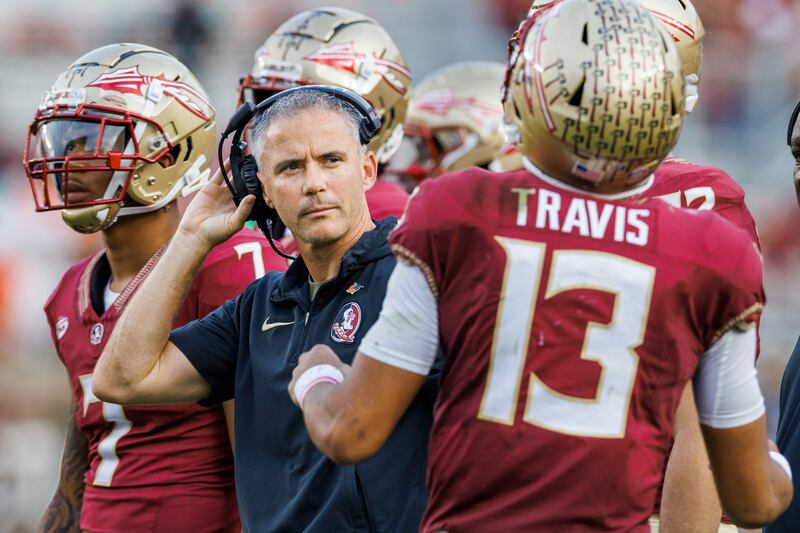They’ve been playing college football games for 154 years, starting in 1869 (four years after the Lincoln assassination). That’s a lot of time to figure things out — enough time to invent cars and airplanes and triple-bladed razors — but apparently not enough to devise an equitable way to determine a national champion in college football.
“What happened today goes against everything that is true and right in college football. A team that overcame tremendous adversity and found a way to win doing whatever it took on the field was cheated today. It’s a sad day for college football.” — Florida State coach Mike Norvell
That’s asking too much; it’s just too difficult. More difficult than, say, landing a man on the moon (54 years ago).
It has become a national pastime every December to criticize the shortcomings of college football’s postseason selection process, and it would take an entire day to review all the times that deserving teams were robbed. But even by those standards, this year’s miss was a doozie, an epic failure.
On Sunday, the selection committee disappeared Oz-like behind the curtain and then reemerged to announce the teams that will advance to the College Football Playoff: Michigan, Texas, Washington and freakin’ Alabama are in; Florida State is out.
The decision to both leave Florida State out and let Alabama in was absolutely defenseless. It’s difficult to believe that 13 reasonably intelligent adults conferred and arrived at this decision. If they were put on the stand in front of a jury and judge, they would melt under cross-examination.
By ignoring FSU and giving Alabama a playoff berth, they didn’t even make a pretense that college football is fair — the deck is stacked in favor of some teams and conferences (hint: their initials are “SEC”), and the rankings and regular-season games are, to some extent, pointless.
The events of last week exposed more than ever the flaws in the system, but the committee still had the discretion to do the right thing. No. 8 Alabama defeated two-time defending national champion Georgia in the SEC championship game and No. 4 Florida State struggled to beat Louisville 16-6 in the ACC championship game while forced to use its third-string quarterback because of injuries.
It still should have been a no-brainer for the committee. Why penalize a team because it had to play without its quarterback? If anything, that should work in the Seminoles’ favor because they managed to win anyway. And since when has an unbeaten Power Five champion ever failed to win a spot in the playoff?
Never.
The selection committee — after ranking FSU No. 4 in four out of its five polls this season and Alabama No. 8 in every poll — vaulted Alabama four spots and into the playoff. The committee was starstruck by Alabama (of the SEC) and its glitzy history instead of wins and losses this season.
“I am disgusted and infuriated with the committee’s decision today to have what was earned on the field taken away because a small group of people decided they knew better than the results of the games,” Florida State coach Mike Norvell told CBS. “What is the point of playing games? … Where is the motivation to schedule challenging nonconference games? We are not only an undefeated P5 conference champion, but we also played two P5 nonconference games away from home and won both of them. I don’t understand how we are supposed to think this is an acceptable way to evaluate a team.”
Amen.
The Seminoles beat three top-25 schools along the way, and won their games by an average margin of almost 16 points. Instead of scheduling a cupcake nonconference game, as so many teams do (including Alabama, which played both Middle Tennessee and Tennessee-Chattanooga), they scheduled and won games against LSU (ranked No. 5 at the time) at a neutral site, and Florida on the road.
They did everything that a team is supposed to do to win a berth in the playoff.
“It renders the season up to yesterday irrelevant,” said FSU athletic director Michael Alford in a statement. “Wins matter. Losses matter. Those that compete in the arena know this. Those on the committee who also competed in the sport and should have known this have forgotten it. Today, they changed the way success is assessed in college football, from a tangible metric — winning on the field — to an intangible, subjective one. Evidently, predicting the future matters more.”
An argument could be made that Florida State deserved to be in the playoff ahead of Texas, as well as Alabama. But Texas defeated Alabama, so to justify Alabama’s inclusion in the playoff the committee had no choice but to include Texas, if you follow.
The 12-team playoff, scheduled to begin next year, can’t come too soon. CFP flack Bill Hancock, the genius who once argued vehemently against any playoff at all, says the 12-team playoff won’t be perfect. Maybe not, but it will be close. It will ensure that every deserving team gets a shot at a championship, and there are never more than 12 teams in a season that can make such a claim (this year six or seven teams can make that claim, including Georgia, which lost only one game, by three points).
It took college football eons to come around to the idea of a playoff, and it has taken another 10 years for the game to realize that a four-team format is woefully inadequate for a 130-team competition (the 32-team NFL has a 16-team playoff). The events of the past two days made that very clear.
“What happened today goes against everything that is true and right in college football,” said Norvell per CBS. “A team that overcame tremendous adversity and found a way to win doing whatever it took on the field was cheated today. It’s a sad day for college football.”



